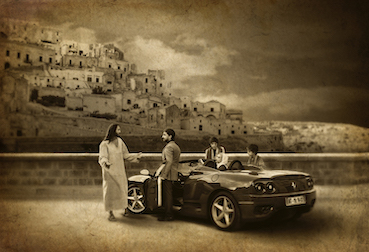
So after packing your bags for a long journey, the doorbell or the phone rings : can I sell you insurance, or have you had a car accident? Do you get that feeling of ‘come on, I need to get on!’ We are looking at Mark 10:17-31 here.
Jesus has spoken with his disciples about relationships including marriage and divorce. He was emphasised that the children who have repeatedly been brought to him represent the ‘least of these’ – the powerless, the ones without a voice. Who could these represent to us today?
Structure

Today I am going to try to represent this passage using formatting. There are five parts of this passage which the reader of most Bibles may not pick up. It is called a Chiastic structure, one where the central point is framed on either side by other related points. The author of Mark’s Gospel often uses a “A-B-A” structure where point A is introduced, point B is the key aspect, and then point A is re-introduced in this new perspective.
A Now a man has sprung up out of nowhere and asks Jesus “What must I do to inherit eternal life?”
B Jesus explains the Commandments but not all of them. Why has he started half way through? Possibly because the first relate to God and the latter half relate to how we relate to others. Jesus responds further by inviting the man – note that he is never deemed to be ‘rich’ – to sell everything and follow Jesus. The man is not well pleased.
C Jesus then turns to the disciples and tries to explain to them about wealth and the kin_dom of God – but they still don’t get it. So he resorts to using a phrase about a camel. It’s going to be hard because the man’s focus is about wealth, whereas the kin_dom of God’s focus is about relationships – the focus of the last conversation.
B Peter explains to Jesus that they have left everything. Many of the disciples have left businesses, such as the fishing for James and John. They could have become wealthy back in Capernaum, possibly like their parents but here they are.
A With God all things are possible, and this also applies here when we try to readdress our focus upon wealth and place it entirely upon relationships.
Note the the way the letters signify the flow of the argument? A represents the question about eternal life and the answer; B represents the point about selling everything and following Jesus, to which Peter responds by saying exactly that – it is possible, see?; and C is the crux of the conversation: relationships, not wealth, is key.
Interesting points
A Jesus seems to indicate that he isn’t good, although it might well be to counter the flattery of the man, which called Jesus a ‘good teacher’. This man is neither rich nor young but a larger landowner. Jesus responds to the man’s question that no one is good – possibly more refuting his flattery than saying that Jesus is no good. The man says that he is blameless akin with Moses, Abraham and Arron. Did he really mean that?
B Jesus recalls the Decalogue which relate the human hardheartedness. However, he adds one commandment “you shall not defraud”. This could be in the small print!
Did this apply to the man or possibly to the wealthy amongst society?
C Now, I have always been a bit confused about the Camel and the needle, if not just for the health and safety aspects. Some would say that, in the Greek, Camel or Kamelos, is quote close to a rope or cable or kamilos, and a small error in the script and the change of perspective is there. Later, in the 16th C CE a door in Jerusalem’s Church of the Holy Sepulchre became known as the eye of the needle…but it is a bit late for here. However, one commentator speaks of a Babylonian phrase, that of “the elephant going through the eye of needle” but “the elephant was the largest animal in Mesopotamia and the camel was the largest in Palestine” [1] Also noted in Berakhot 55b of the Talmud there is this expression, “They do not show a man a palm tree of gold, nor an elephant going through the eye of a needle.”
Just as Jesus has used exaggeration when speaking of cutting off your foot or your hand, or gouging out your eye, or hanging a millstone around your head in recent dialogues, it is maybe just to make a point others will remember. Hence he adds the adjective ‘rich’ to the man to increase the difficulty.
Reflection
Is this about the balance of wealth and relationships, or entering into the Kin_dom of God? We read in jjgsd that we will receive blessings 30-, 60- and 100- fold. But in what? Was it in commodities, siblings, mothers and children, …. persecutions – really?
Perhaps the kin_dom of God is not about receiving material possessions, benefits which bring us wealth, but being with God. What treasures would you like to store up in Heaven?
Cover image from https://dailytheology.org/2013/05/02/the-rich-young-man-and-privilege/
[1] Bailey, Kenneth., Poet & Peasant and Through Peasant Eyes, (Grand Rapids: Eerdmans, 1980), p. 166.
I loved the dialogue